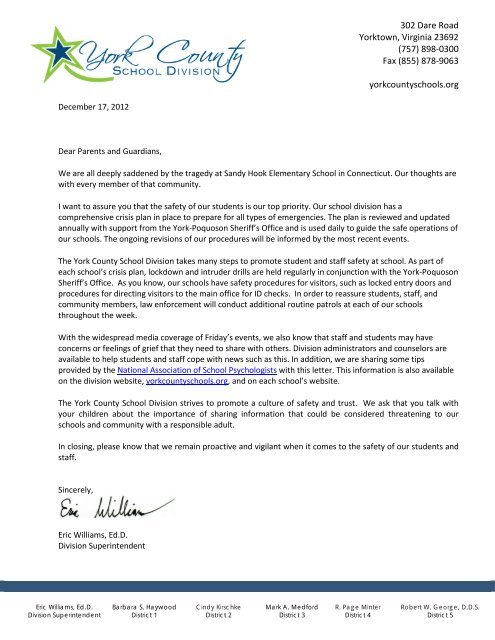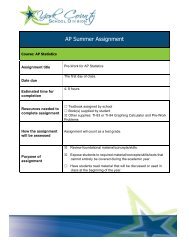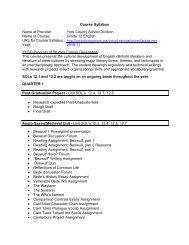School Safety Letter & Parent Tips - York County Schools
School Safety Letter & Parent Tips - York County Schools
School Safety Letter & Parent Tips - York County Schools
Create successful ePaper yourself
Turn your PDF publications into a flip-book with our unique Google optimized e-Paper software.
302 Dare Road<br />
<strong>York</strong>town, Virginia 23692<br />
(757) 898-0300<br />
Fax (855) 878-9063<br />
yorkcountyschools.org<br />
December 17, 2012<br />
Dear <strong>Parent</strong>s and Guardians,<br />
We are all deeply saddened by the tragedy at Sandy Hook Elementary <strong>School</strong> in Connecticut. Our thoughts are<br />
with every member of that community.<br />
I want to assure you that the safety of our students is our top priority. Our school division has a<br />
comprehensive crisis plan in place to prepare for all types of emergencies. The plan is reviewed and updated<br />
annually with support from the <strong>York</strong>-Poquoson Sheriff’s Office and is used daily to guide the safe operations of<br />
our schools. The ongoing revisions of our procedures will be informed by the most recent events.<br />
The <strong>York</strong> <strong>County</strong> <strong>School</strong> Division takes many steps to promote student and staff safety at school. As part of<br />
each school’s crisis plan, lockdown and intruder drills are held regularly in conjunction with the <strong>York</strong>-Poquoson<br />
Sheriff’s Office. As you know, our schools have safety procedures for visitors, such as locked entry doors and<br />
procedures for directing visitors to the main office for ID checks. In order to reassure students, staff, and<br />
community members, law enforcement will conduct additional routine patrols at each of our schools<br />
throughout the week.<br />
With the widespread media coverage of Friday’s events, we also know that staff and students may have<br />
concerns or feelings of grief that they need to share with others. Division administrators and counselors are<br />
available to help students and staff cope with news such as this. In addition, we are sharing some tips<br />
provided by the National Association of <strong>School</strong> Psychologists with this letter. This information is also available<br />
on the division website, yorkcountyschools.org, and on each school’s website.<br />
The <strong>York</strong> <strong>County</strong> <strong>School</strong> Division strives to promote a culture of safety and trust. We ask that you talk with<br />
your children about the importance of sharing information that could be considered threatening to our<br />
schools and community with a responsible adult.<br />
In closing, please know that we remain proactive and vigilant when it comes to the safety of our students and<br />
staff.<br />
Sincerely,<br />
Eric Williams, Ed.D.<br />
Division Superintendent<br />
Eric Williams, Ed.D.<br />
Division Superintendent<br />
Barbara S. Haywood<br />
District 1<br />
Cindy Kirschke<br />
District 2<br />
Mark A. Medford<br />
District 3<br />
R. Page Minter<br />
District 4<br />
Robert W. George, D.D.S.<br />
District 5
302 Dare Road<br />
<strong>York</strong>town, Virginia 23692<br />
(757) 898-0300<br />
Fax (855) 878-9063<br />
yorkcountyschools.org<br />
What <strong>Parent</strong>s Can Do:<br />
1. Reassure children that they are safe. Emphasize that schools are very safe. Validate their feelings.<br />
Explain that all feelings are okay when a tragedy occurs. Let children talk about their feelings, help<br />
put them into perspective, and assist them in expressing these feelings appropriately.<br />
2. Make time to talk. Let their questions be your guide as to how much information to provide. Be<br />
patient. Children and youth do not always talk about their feelings readily.<br />
3. Keep your explanations developmentally appropriate.<br />
• Early elementary school children need brief, simple information that should be balanced with<br />
reassurances that their school and homes are safe and that adults are there to protect them.<br />
• Upper elementary and early middle school children will be more vocal in asking questions about<br />
whether they truly are safe and what is being done at their school. They may need assistance<br />
separating reality from fantasy. Discuss efforts of school and community leaders to provide safe<br />
schools.<br />
• Upper middle school and high school students will have strong and varying opinions about the<br />
causes of violence in schools and society. They will share concrete suggestions about how to make<br />
school safer and how to prevent tragedies in society. Emphasize the role that students have in<br />
maintaining safe schools by following school safety guidelines communicating any personal safety<br />
concerns to school administrators, and accessing support for emotional needs.<br />
4. Review safety procedures. This should include procedures and safeguards at school and at home. Help<br />
children identify at least one adult at school and in the community to whom they go if they feel<br />
threatened or at risk.<br />
5. Observe children’s emotional state. Some children may not express their concerns verbally. Changes<br />
in behavior, appetite, and sleep patterns can indicate a child’s level of anxiety or discomfort. In most<br />
children, these symptoms will ease with reassurance and time. However, some children may be at risk<br />
for more intense reactions. Children who have had a past traumatic experience or personal loss, suffer<br />
from depression or other mental illness, or with special needs may be at greater risk for severe<br />
reactions than others. Seek the help of mental health professional if you are at all concerned.<br />
6. Limit television viewing of these events. Limit television viewing and be aware if the television is on<br />
in common areas. Developmentally inappropriate information can cause anxiety or confusion,<br />
particularly in young children. Adults also need to be mindful of the content of conversations that they<br />
have with each other in front of children, even teenagers, and limit their exposure to vengeful,<br />
hateful, and angry comments that might be misunderstood.<br />
7. Maintain a normal routine. Keeping to a regular schedule can be reassuring and promote physical<br />
health. Ensure that children get plenty of sleep, regular meals, and exercise. Encourage them to keep up<br />
with their schoolwork and extracurricular activities but don’t push them if they seem overwhelmed.<br />
Provided by the National Association of <strong>School</strong> Psychologists<br />
Eric Williams, Ed.D.<br />
Division Superintendent<br />
Barbara S. Haywood<br />
District 1<br />
Cindy Kirschke<br />
District 2<br />
Mark A. Medford<br />
District 3<br />
R. Page Minter<br />
District 4<br />
Robert W. George, D.D.S.<br />
District 5
















